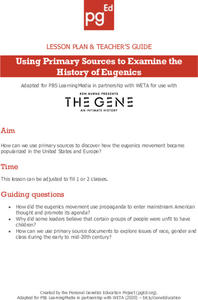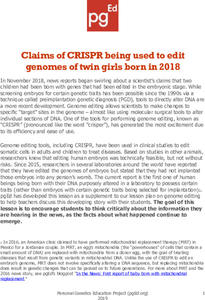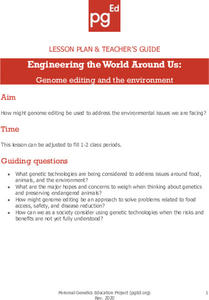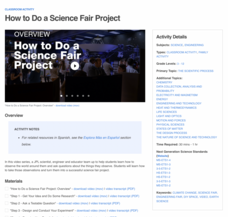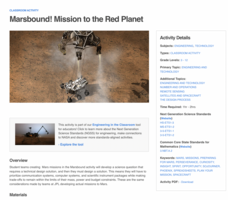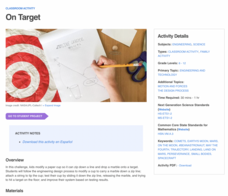NASA
Analyzing Surface Air Temperatures by Latitude: Student Activity
Explore global temperatures from the comfort of your learning place! Meteorologists analyze surface temperatures and anomalies across different latitudes. Investigators evaluate graphs to find temperature differences and answer questions...
NASA
Global Air Temperatures Graph: Student Activity
Analyze years of hard climate change evidence in minutes. Climatologists evaluate graphical data about climate change by answering questions. Scientists work collaboratively using a literacy cube or virtual die that directs them through...
GLOBE Program
Observing Visibility and Sky Color
What does a beautiful sunset have to do with the atmosphere? An inquiry-based lesson has learners make observations about the visibility and color of the sky during different time periods. They then relate their observations to...
NASA
Missed Messages
Learners investigate the challenges of space communication with a kinesthetic modeling activity. Group members In space must communicate one word to other members on Earth while overcoming barriers such as distance, gravity, and physical...
Personal Genetics Education Project
Using Primary Sources to Examine the History of Eugenics
Eugenics philosophy takes survival of the fittest to a whole new level. With a research-focused lesson, young scientists examine the history of the eugenics movement and its impact on society. Pupils engage with a video clip, primary...
Personal Genetics Education Project
Claims of CRISPR Being Used to Edit Genomes of Twin Girls Born in 2018
Here is an activity that blends genetic technology, literacy skills, and critical thinking. Pupils review background information about cell lines and CRISPR by video and teacher-led discussion. Scholars collaborate to analyze two...
Personal Genetics Education Project
Genome Editing and CRISPR
Explore the excitement and ethical challenges of CRISPR and genetic-editing technology. Participants engage in do-nows, view a slideshow, and collaborate on scenarios about genetic editing. Group members analyze scenarios to generate...
Personal Genetics Education Project
Reproductive Genetic Testing: Technology, Access, and Decision Making
Explore the complexities of reproductive genetic testing respectfully in the learning space. Scientists read articles, view a slideshow, and complete a do-now about genetic technologies. A fishbowl activity allows scholars to discuss the...
Personal Genetics Education Project
How Does Ancestry Testing Work? Exploring Admixture Testing
Find out the science behind ancestry testing! Investigators watch a video exploring how ancestry works before participating in a hands-on group activity. Scholars role play scientists while learning about testing protocols and test...
Personal Genetics Education Project
Engineering the World Around Us: Genome Editing and the Environment
Challenge young minds to build a better world with genetic engineering. Biologists learn potential solutions for environmental issues using genome editing while interacting with three case studies. Scholars read articles and view...
NASA
Art and the Cosmic Connection
Solar art inspires! Scholars study planetary geology with an artistic analysis. Pupils view a PowerPoint presentation on the solar system and space exploration and then try their hand at planetary image analysis using art techniques.
British Council
Upcycling
It's time for a new life! Scholars learn what it means to give products new life by upcycling. They complete a crossword puzzle, read and discuss an article, and play a game about upcycling ideas.
British Council
Sports in (Climate) Crisis
Can sports affect the climate? Scholars read an article about the effects sports have on the enivronment. They then complete a problem tree sheet to brainstorm solutions for the issue.
NASA
Exploring Exoplanets with Kepler
Calculate the movement and properties of planets like professional astronomers! Scholars use Kepler's third law to find Mercury and Venus's distance from the sun. Using changes in brightness of distant stars and Kepler's third law,...
NASA
How to Do a Science Fair Project
Build problem-solving skills with science! Step-by-step videos walk investigators through each stage of completing a science fair project. Scientists learn to formulate a testable question, design an experiment, collect data, draw...
NASA
Water Filtration Challenge
Can the class think like the scientists on the International Space Station? Engineers design, test, collect data, and improve a water filtration device similar to a system found on the ISS. Participants use pH strips, optional...
NASA
Feel the Heat
Heat water up like a NASA engineer. Using the engineering design process, investigators create a system to trap and move heat through a water-filled tube. Designers participate in a post-activity discussion that highlights the role of...
NASA
Marsbound! Mission to the Red Planet
Changing one aspect of a mission impacts all the others. Learners consider a list of criteria as they develop their own science questions related to Mars and design a solution while considering all the important systems: computer,...
NASA
Collecting Light: Inverse Square Law Demo
Light, distance, and mathematics come together to help scientists plan for space missions. Groups examine the relationship between distance from the sun and light availability in a hands-on exploration activity. They model the inverse...
Bonneville
Bioreactor Water Circulation System
Make those microbes warm up water. Pupils first investigate water pumps, then design a water circulation system that uses solar energy. A bioreactor in the system takes energy from compost and helps heat water.
Bonneville
Compost Bioreactor Design
Organic waste is a hot topic. The second of three installments in the Bioreactor Water Heating unit challenges pupils to create bioreactors that collect energy released from compost. After watching videos on the properties of water and...
Bonneville
Passive Solar Water Heating
Put empty milk jugs to good use. Scholars consider the characteristics they might change about a milk jug to improve light absorption. They design a passive solar water heater using the milk jug and then measure the temperature change in...
NASA
Evaluating a Lunar Eclipse
Do all lunar eclipses look the same? Find out in an activity where astronomers use the Danjon Scale of Lunar Eclipse Brightness to describe the color and brightness of the moon during an eclipse. Explorers make three observations using...
NASA
On Target
Crash into engineering by sending a marble to land on a target by way of a zip line. Using a zip line, pupils put engineering design processes into practice by modifying a cup to carry and release a marble onto a target. Scientists test,...






